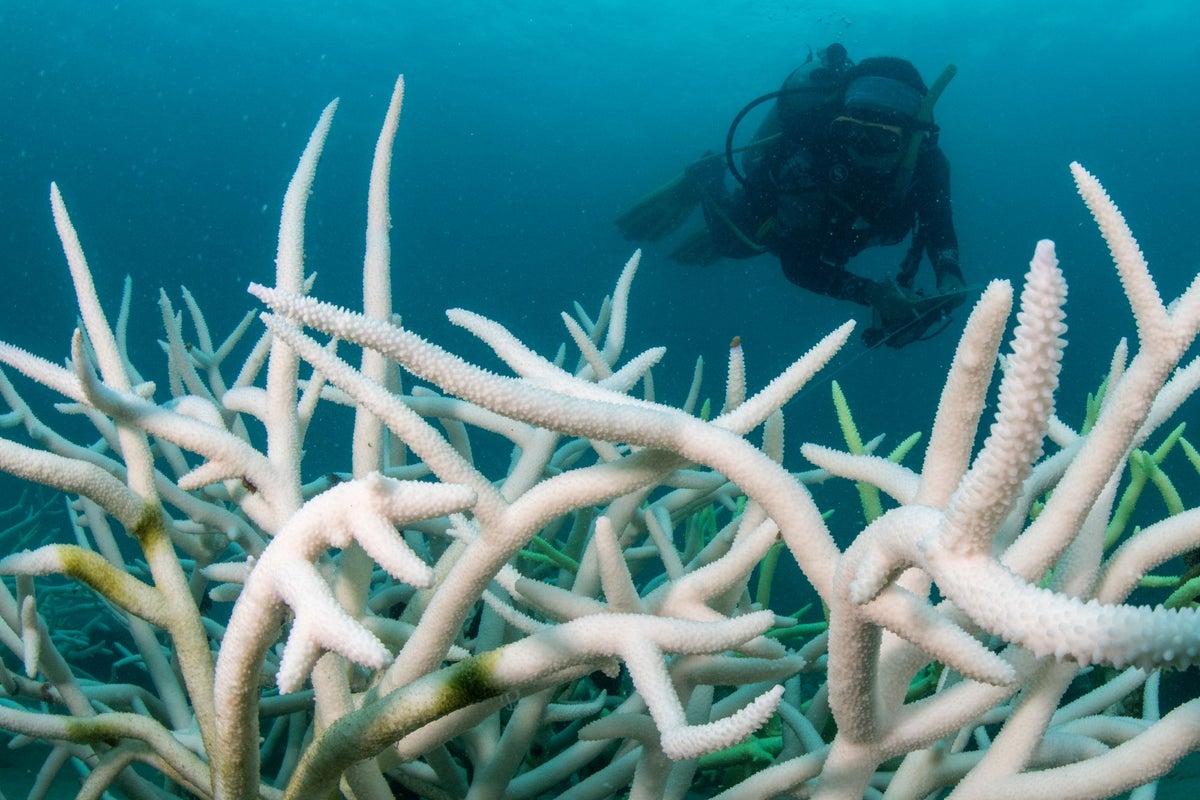The Earth has reached its first climate tipping point, signaling a bleak new reality for the planet and hastening of a dire future scientists had once believed was still far away.
In a damning new report Monday, 160 international researchers warned that amid boiling ocean temperatures, warm-water coral reefs such as the Australia’s Great Barrier Reef have passed a point of no return — and the majority are now expected to decline.
The latest Global Tipping Points Report, led by the University of Exeter and released ahead of next year’s Cop30 climate summit in Brazil, says that coral ecosystems – on which about a billion people depend for food and livelihood – are now tipping into an irreversible decline. This means the Earth has entered a “new reality”.
Close to a billion people and a quarter of all marine life depend on those animals, which are some of the most diverse ecosystems in the world and protect coastlines from major storms. They are also colorful attractions for snorkelers and divers. But the reefs already experienced unprecedented stress and many could be lost for good unless global warming is reversed, report author Dr. Mike Barrett, chief scientific advisor at World Wide Fund for Nature-U.K., said in a release.
“This grim situation must be a wake-up call that unless we act decisively now, we will also lose the Amazon rainforest, the ice sheets and vital ocean currents,” he explained. “In that scenario we would be looking at a truly catastrophic outcome for all humanity.”
Barrett said the Earth is nearing other tipping points that could be reached in the coming years – and be devastating for climate on Earth.
The tipping points are critical thresholds identified by climatologists that, once passed, are expected to result in irreversible and dangerous impacts to the planet’s climate with catastrophic implications for humanity. They include the Arctic permafrost thawing, a slowdown of critical ocean circulation in the Atlantic, the melting of the Greenland and West Antarctic ice sheets, the loss of the Amazon rainforest and shifts to northern forests and West African and Indian monsoons.
More than 100 million people rely on South America’s already-devastated Amazon for food and water, and it is home to thousands of animal and plant species.
However, the report’s authors found that the forest could deteriorate with 1.5 degrees Celsius (2.7 degrees Fahrenheit) of warming above pre-industrial levels – a lower estimate than previously thought.
The collapse of the Atlantic Meridional Overturning Circulation – a system of deep ocean currents that acts as the Earth’s central heating system – is at risk even below 2 degrees Celsius of global warming, they said.
The newest potential collapse is projected to result in extremely harsh winters in western Europe akin to a small Ice Age and pose a severe threat to global food security.
Prior timelines for these events showed tipping points happening with several more degrees of warming closer to the end of the century.
“Twenty years ago it was thought that it would take four to five degrees of global warming for tipping points to become as likely as not,” University of Exeter professor Tim Lenton, a co-author, told The Independent, “now we think that is the case in the one-to-two-degree range of global warming.”
The planet has already warmed 1.2 degrees Celsius (2.2 degrees Fahrenheit) since the Industrial Revolution, and an October 2024 United Nations report said the world is on track for 3.1 degrees Celsius (5.6 degrees Fahrenheit) of global warming by 2100.
Every fraction of a degree of global warming is expected to worsen the consequences of climate change.
Even so, Lenton says he believes Earth can “still avoid the worst” by taking sweeping mitigative action.
Lenton, Barrett and their partners urged countries to trigger what they called “positive tipping points” to counter these effects, such as rolling out new technology, transitioning to clean energy like wind and solar and drastically slashing polluting greenhouse gas emissions.
Next month, world leaders – likely excluding the U.S. – are set to meet in Brazil for the United Nations’ annual conference to address climate change.
Although some impacts may now be inevitable, the report’s authors said they hoped countries attending the conference will show the “political bravery” necessary to reach solutions to these crises and avert catastrophe.
Current policies are not adequate to respond to the scale of these perilous outcomes and often even don’t take tipping points into account, researchers said.
Last year, rich countries agreed to pool together at least $300 billion a year by 2035 – far short of the $1.3 trillion developing countries had said is needed to address climate impacts on the front lines.
“Only with a combination of decisive policy and civil society action can the world tip its trajectory from facing existential Earth system tipping point risks to seizing positive tipping point opportunities,” he said in a statement.

